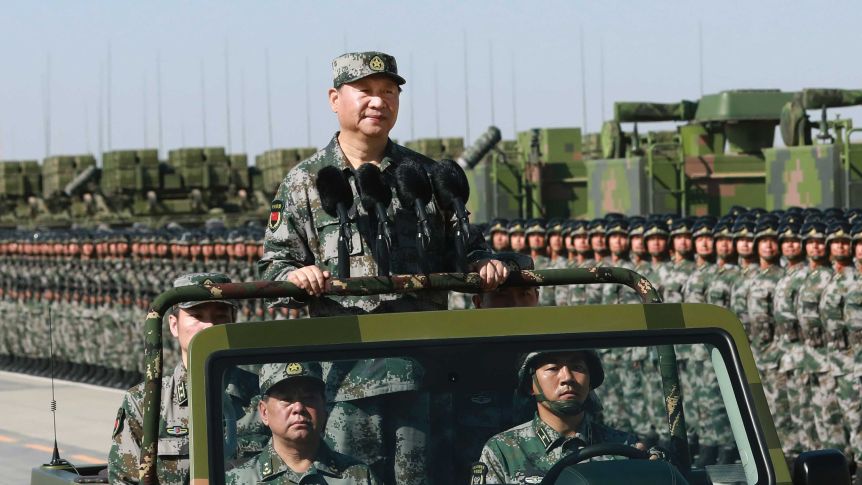He is being blamed for creating and hiding the Wuhan virus, no one wants to befriend him due to his blatant belligerence and now he is also facing mutiny from the military forces of his country. 2020 is turning out to be an awful year for Chinese President Xi Jinping. And the Galwan valley clash between the Indian Army and the People’s Liberation Army (PLA) of China could very well prove to be the reason for his undoing.
Jianli Yang, a Chinese dissident and the son of a former Chinese Communist Party (CCP) leader, has spilled the beans on unrest brewing within the PLA ever since the Indian Army inflicted heavy casualties on the Chinese Army.
Yang wrote an op-ed in the Washington Post titled, “Retired and hurt PLA veterans could become a force against the Chinese Communist Party regime”. He says, “the CCP leadership cannot afford to undermine the veterans’ potential to launch a collective and “armed” anti-regime action.”
At the root of growing anger and resentment within the PLA veterans serving officers is the refusal of the CCP regime to disclose the number of casualties during the Galwan Valley clash.
Within Chinese social media too, there was widespread resentment against the Xi Jinping regime as it did not even honour those who were killed in the clash. Weibo, China’s version of Twitter saw many citizens take potshots at the CCP.
On June 19, a Weibo user said, “India has held a memorial service for the sacrificial soldiers. It shows the high respect and attention of the whole country of India to the soldiers who defend the country and the land.”
It is not possible to know much about what goes on within China due to the wild censors on its social media, but Yang gives us some valuable insights.
He says that the disgruntled veterans, many of whom participated in the bloody Korean war and the 1979 Sino-Vietnamese war, “have been holding frequent mass protests across China for years now, hoping to shame the government into recognizing its obligation toward those who battled along the country’s borders in the past.”
Yang adds, “All they seek is better health care, pensions, and jobs, as a mark of due gratitude for their service to the nation. Shockingly, however, the country which has the world’s largest army, does not have a central agency to administer pensions and other benefits to its veterans. Resultantly, they are forced to depend on local governments for pensions, medical care, and other basic benefits.”
There is a wide disparity in the financial conditions of the local Chinese governments, and consequently, there is no standard pension for retired Chinese soldiers. According to the Chinese dissident, the veterans find themselves left at the mercy of corrupt local bureaucracy by the CCP which makes them feel like “donkeys slaughtered after they are too old to work a grindstone.”
The fate of the present PLA soldiers has only exacerbated the fury of the veterans. The PLA soldiers were forced by China to take on a professional Indian Army, and the results were catastrophic for the PLA.
Even worse, the Xi Jinping regime was never willing to admit that it got PLA soldiers butchered. Yang says Chinese Foreign Ministry spokesman Zhao Lijian did not acknowledge the number of casualties during his June 22 conference saying, “I have no information to offer.”
A day later, he again avoided giving any information and only said that reports of more than 40 Chinese soldiers circulated by Indian media was “false information”.
But then the same spokesperson had given a “step-by-step account of the Galwan clash (the Chinese version, of course) and China’s position on settling this incident.”
Jianli Yang, who now lives in the US wonders, “What country does not even acknowledge the martyrdom of its uniformed soldiers at its borders, let alone pay them a respectable last homage?”
He then adds, “It is China, which reels under the fear that the admittance that it had lost troops, that too more in number than its opponent, could lead to such major trouble and domestic unrest, that the very regime of the Chinese Communist Party (CCP) could be put at stake.”
Xi Jinping fears that a mutiny within the PLA strongly backed by the disillusioned PLA veterans could get him unseated. The CCP itself fears getting overthrown. Yang says the Communist regime snoops on PLA veterans who engage in protests and there have been “mysterious deaths of veterans who have been actively petitioning the government for their dues.”
The US-based Chinese human rights activist also says that the leadership of Xi Jinping is under threat, “The PLA has long been a key pillar of the CCP’s power. If the sentiments of the serving PLA cadres are hurt and they get together with the millions of disgruntled veterans (which may be facilitated by those within the PLA who are already unhappy with Mr. Xi — and there are thousands of them, such as those who were hurt by Mr. Xi’s move to separate PLA from commercial activities), they could form a formidable force capable of challenging Mr. Xi’s leadership.”
The Galwan Valley clash could, therefore, prove to be the very trigger point of Xi Jinping’s downfall. Escalating military tensions against India has proved to be a highly regrettable mistake for Xi Jinping.
